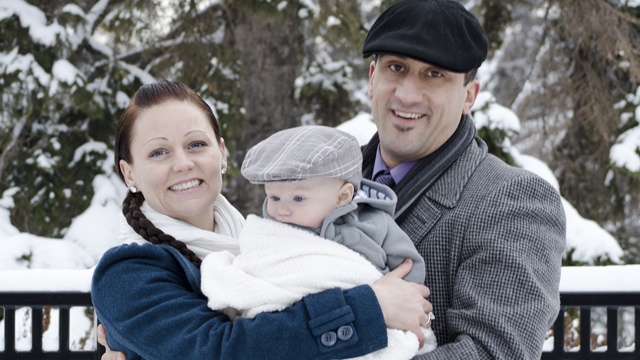(Editor’s Note: It’s National Addictions Awareness Week across Canada and we bring you a story of a man who has struggled with addictions for almost three decades. Jeffery Chalifoux’s story is one of self-destruction and redemption even after he appeared to get his life together.)
Brandi Morin
APTN National News
Every day, sometimes by the hour, Jeffery Chalifoux makes a choice to stay sober.
It’s been a struggle for most of his 36 years.
He’s seven months clean right now.
The social worker and motivational speaker, said it’s a path he’s determined to stay on. Living clean – not only for himself – but for his wife and two-year-old son.
Like many people with addictions Chalifoux started young. He was 13-years-old when he started getting high. At 15, Chalifoux was in jail.
Drugs, alcohol and sex were his vices.
“The drugs became a way for me to cope with my struggles,” said Chalifoux. “Struggles with identity, sexual identity and just trying to be normal.”
The Edmonton man said he never felt like he fit in, he was confused about his identity as an Indigenous man because the Aboriginal culture was stifled in his family. He was also bi-sexual which caused him further discomfort in expressing it publicly.
For 15 years Chalifoux spent time in, and out of jail, as well as lived on the streets of Edmonton. It wasn’t until he was facing a long jail sentence that he decided to get serious about getting clean and trying to stay that way.
“All that time I wanted to quit and change my behaviour. I knew it wasn’t congruent with my spirit. I knew that it was eating away at me,” he said.
By the time he was 30, and having completed treatment, Chalifoux gained a fresh sense of purpose through volunteering in his community.
“Going back to volunteer was a key component to becoming successful. I spent so many years taking from people that this was my chance to get back,” he said.
Soon after Chalifoux enrolled in college and earned a social worker diploma. He then started his own consulting company, Heartspeak Consulting. Offering First Aid training, motivational speaking, workshops, addictions counselling and all that goes with it. He got married, started a family and for the first his life was on track.

But the pull of addiction never really lets go.
It snagged him again last year almost taking him down completely.
“’The addictions came back … My ability to cope with home life, school, business … I was over working myself,” he said.
The stress caused Chalifoux to develop health problems which required him to take addictive pain medication.
Then he overdosed.
He recovered but still fell back into a slump and a couple of months later landed back in jail after breaking into the Edmonton YMCA one evening during an alcohol infused blackout.
He’s been sober since April 22.
“It’s a lifelong battle,” he said. “It’s something you have to be mindful of, that a person can resort to those old coping mechanisms if they don’t take care of themselves.”
It starts with being honest, he said.
“Become honest and integral in your life. About who you are and what your passions are. And become integral in your actions,” he said, adding support is key. “The 12 steps of recovery, or self-help groups. Surround yourself with others who will support you and seek help from professionals.”
But none of that really matters without self-awareness and knowledge of addictions.
“Learn about addiction and about yourself. If you’re suffering with a mental illness, and addiction is a mental illness, we can learn why and learn about what might be contributing to it,” he said.
Finding meaning and purpose is another key to becoming successful, said Chalifoux. To discover what is meaningful, helped encourage him to go further in life.
Which lead to the last piece of advice he offered about giving back.
“Become connected with your community- it provides more meaning and purpose. Having connection and identity and all that goes with it. Those that suffer in addiction do so because they may not engage in other healthy ways of living life and doing things. For me I volunteered and from there other opportunities came up,” he said.
He finds further strength through the support of his wife and spending time with his family. He encourages others to share their stories because he said there’s healing in that.
“Know that you are worthy of being free from addictions. Know that there’s purpose and meaning in life that you’re worthy of finding and living,” he said.
Chalifoux received the 2015 Lieutenant Governor Circle on Mental Health and Addictions “True Grit” award and is also a Belcourt Brosseau Metis award recipient.









